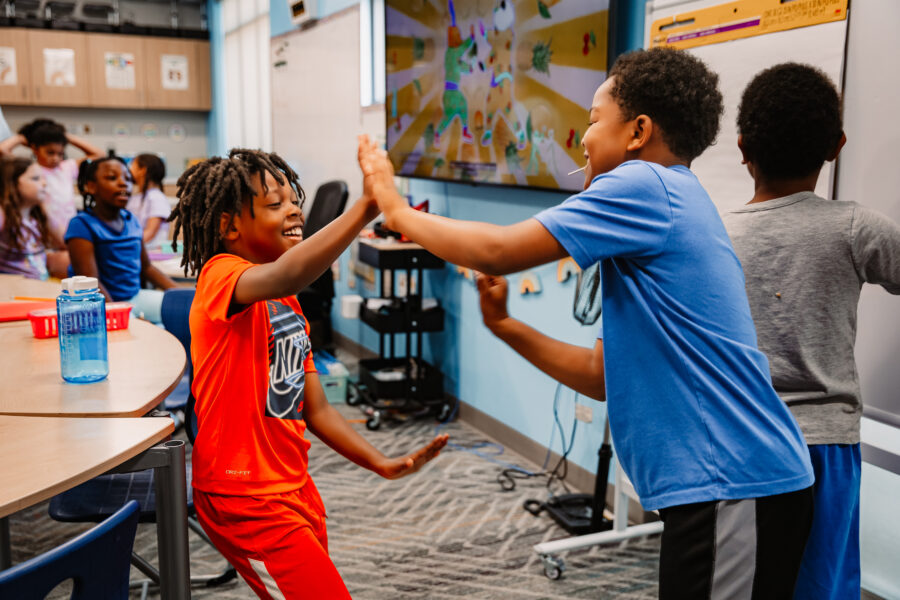Summer Learning Labs Fill Gaps for Rural Indiana Communities
In the rural Indiana cities of Salem and Wabash, educational opportunities during the summer are scarce. However, Summer Learning Labs (SLL), created by The Mind Trust with support from the Indiana Department of Education and in partnership with local community organizations, is striving to fill those gaps by offering vital academic and enrichment programs for students who might otherwise be left behind. In Salem and Wabash, partners are Creating Avenues for Student Transformation (CAST) and the Wabash County YMCA, respectively. Though these communities are smaller than some others offering SLL, the impact is still significant with Salem serving more than 50 students and Wabash with nearly 200 students attending.
Communities in Need
The Summer Learning Labs programs all consist of the same general schedule. Students receive academic instruction in ELA and math during the morning, followed by enrichment activities in the afternoon.
Salem and Wabash are two of the most rural areas in Indiana. Salem has a high school graduating class of only 50-70, and Wabash is not far ahead with around 100 students graduating each year. For many rural families, the Labs are a lifeline for childcare and support, offering free academic programs, meals, and time with friends. While students in urban areas have access to summer programming and extracurriculars, rural parents often have limited options for summer programming, if any at all.
In Salem, the Southeast SLL are hosted at two sites, free, and runs from 9:00 a.m. to 2:00 p.m., along with breakfast and lunch provided by the YMCA. They’ve devised two solutions to ensure students can access the program. They partnered with the local YMCA to offer early drop-off and late pickup options for $50 a week. Additionally, CAST has contracted with West Washington Elementary School to provide a free bus and driver for students, ensuring that they get to and from Campbellsburg, a neighboring rural community, safely.
In Wabash, Wabash SLL are hosted at two sites, serving three school district communities: Wabash City Schools, MSD of Wabash County, and Manchester Community Schools. The sites offer free programs from 8:00 a.m. to 3:00 p.m.Breakfast and lunch are provided by the site through the Summer Food Services Program, which feeds all children under 18 years of age. Students from both Wabash City Schools and the MSD of Wabash County can attend. The Wabash County YMCA also partnered with these districts to provide transportation to their respective students.
Targeted Support and Trusted Relationships
SLL are open to all students, and in these regions, target students on the brink of academic success, inviting them to join the program. This year in Salem, the third-grade group is large, reflecting the program’s focus on students who are most in need of assistance. For Wabash, an existing summer program doubled in size thanks to added funding, making it possible for more students in the county to receive help.
This specific support is provided thanks to the strong partnerships with community organizations in each community. Families in Salem already have an established connection with CAST as they are an Indiana Learns partner and a regular tutoring presence in the community. Wabash County YMCA is another example of an already trusted organization making new gains with the Summer Learning Labs. In fact, Amanda Stuard, the SLL site leader at Metro North Elementary (Metro North) in Wabash, describes this year’s new program as “bigger than it ever has been.” Despite the challenges of organizing such an extensive initiative, Amanda is enthusiastic about the positive impact. “It’s hard to put together, but they are good challenges,” she says.
Community connection is an essential part of the Summer Learning Labs’ success. The relationships built with local organizations help ensure the program meets the specific needs of the students and their families, fostering an environment where academic support is accessible and effective.
Teacher Perspectives
Rachel Irwin, a teacher at the Bradie Shrum Lower Elementary (Bradie Shrum) site in Salem, who usually has up to eight students in her class, highlights the necessity of the program, particularly for third graders. “This is just huge in terms of giving direct services to students who wouldn’t get it otherwise. We track and see an upward trend in scores. I’m confident after seeing each pre-test result, that the school’s overall scores will increase by the end of the summer.”
Nancy Predmore, a SLL teacher at Bradie Shrum, notes the economic challenges faced by many families in the area. “Most of the kids I have wouldn’t be here if they had to pay for it. We’re a low-income school system, and everyone at this elementary school gets free lunches. We’re looking at 60% or more qualifying for free or reduced lunch.”
Marty Hoppert, a SLL teacher at Metro North, emphasizes the unique opportunities ISLL provides. “These kids wouldn’t normally get the chance to do things like Sky Zone or have individual one-on-one times that regular school time can rarely provide,” she notes.
A Brighter Future
Summer Learning Labs is more than just a summer program; it’s a game-changer for rural Indiana communities like Salem and Wabash. By providing structured academic support, fostering strong teacher-student relationships, and addressing the unique needs of low-income families, SLL ensures that students have the opportunity to thrive both academically and personally.
Sierra Hall, another educator, highlights the program’s importance for underserved children who often face summer learning gaps. “Many kids are scared to leave school for summer. This is a great place to experience new things. Some have never been out of Wabash County, and this is a way they can do it,” she explains.
SLL programs are also operating in Indianapolis, Northwest Indiana, and South Bend this summer. By expanding its reach to these additional communities, the program continues to provide vital support to even more students, helping them overcome the barriers they face and paving the way for a brighter future.

